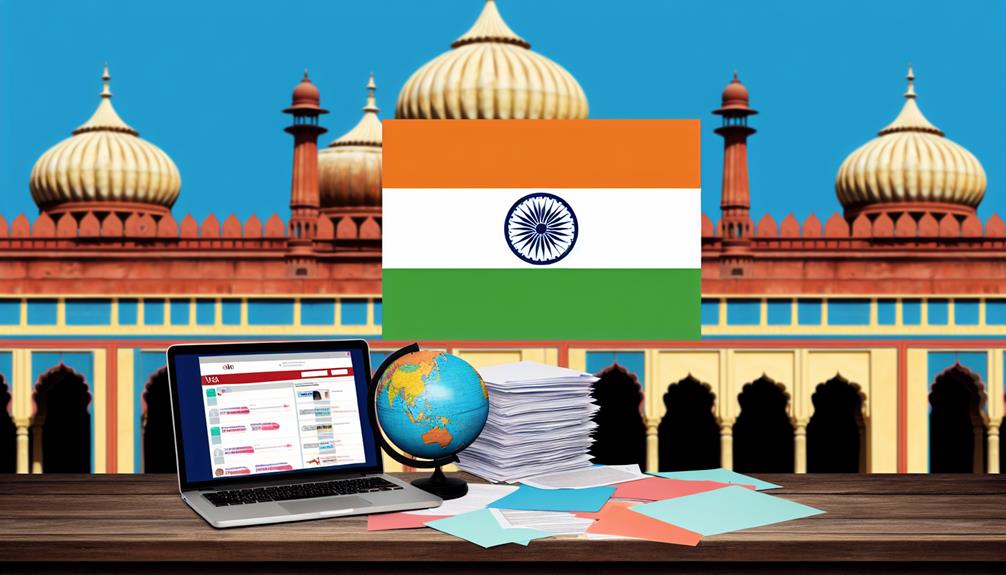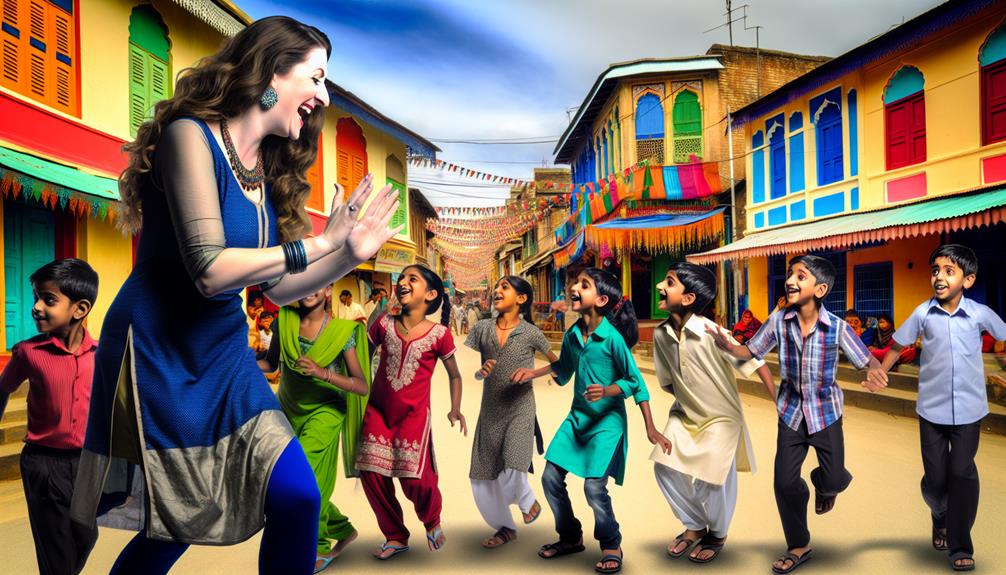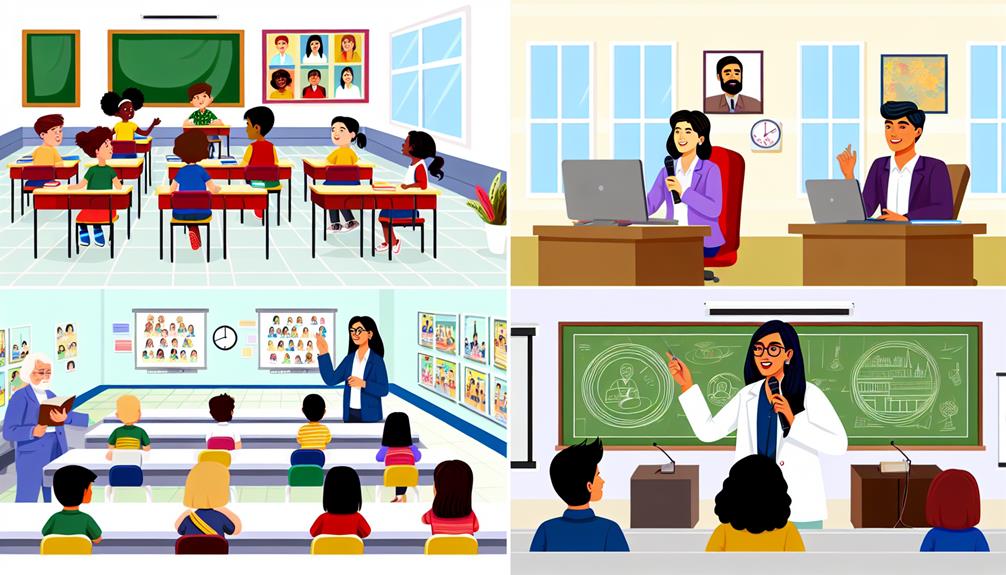How to Apply for Teaching Jobs in India
Imagine standing in a bustling schoolyard, vibrant with the laughter of enthusiastic students, as you consider your path to becoming a teacher in India. You'll need to navigate a landscape filled with qualifications and certifications, but the journey doesn't end there. Understanding the job market, exploring the right resources, and leveraging your network can greatly influence your success. What steps should you take to guarantee your application stands out in this competitive environment?
Key Takeaways
- Obtain the necessary educational qualifications, preferably a Bachelor's degree with a B.Ed. and relevant teaching certifications like CTET or TEFL.
- Utilize online job portals such as Naukri.com and Indeed to find and apply for teaching positions.
- Prepare a tailored resume and cover letter highlighting qualifications and experience for each application.
- Attend walk-in interviews for immediate hiring opportunities and interact directly with hiring managers.
- Engage in networking through educational conferences and social media platforms like LinkedIn to discover job openings and connect with potential employers.
Qualifications for Teaching in India
To land a teaching job in India, you'll need to meet specific qualifications that often include a Bachelor's degree, ideally in Education (B.Ed.) or a subject-specific field for higher education roles.
Having a degree is just the starting point; many schools require teaching certifications like the Central Teacher Eligibility Test (CTET) or Teacher Eligibility Test (TET) for public positions. If you're aiming to teach English, obtaining a TEFL certification can greatly enhance your job prospects.
Experience teaching, whether through internships or previous roles, is highly valued in the competitive jobs in India. Strong communication skills and effective classroom management abilities are essential, as they help you engage students and foster a positive learning environment.
Subject matter expertise is also critical; being knowledgeable in your area can set you apart from other candidates.
Continuous professional development is crucial. Attending workshops and training sessions can't only boost your skills but also improve your chances of landing a job.
In short, focus on obtaining the right qualifications, gaining experience, and staying updated with teaching certifications to make yourself an attractive candidate in the Indian education sector.
Visa Requirements for Teachers

Managing visa requirements for teaching in India can seem intimidating, but it's essential for a smooth shift into your new role. Before you travel, contact the Indian embassy to understand the specific visa requirements based on the teaching position you're applying for. Generally, you'll need a work visa, which some schools may sponsor or partially cover. Confirm these details with potential employers to avoid surprises.
Start your visa application process early, as processing times can vary by visa type. Delays can disrupt your plans, so don't wait until the last minute. Understanding the visa regulations is crucial for compliance; overstaying or working without the proper visa can lead to serious legal issues you want to avoid.
Some schools may offer assistance with the visa process, so don't hesitate to ask about support during the hiring process. By getting clear information and following the necessary steps, you can navigate this part of your journey smoothly.
And remember, just like how websites use cookies to enhance your experience, being proactive with your visa requirements helps guarantee a successful shift into your teaching role in India.
Living Conditions in India

Living in India can be an exciting adventure, especially for international teachers drawn to its vibrant cities like Mumbai. The city offers a dynamic lifestyle, rich in cultural experiences that can enhance your time abroad.
You'll find furnished apartments at reasonable rates, allowing you to live comfortably while enjoying all that India has to offer. The cost of living in Mumbai is generally lower than in many Western countries, although it can vary depending on your lifestyle choices.
Embracing Indian cuisine may require some adjustment, but the diverse spices and flavors will surely tantalize your taste buds. Plus, you'll have access to a range of foreign restaurants to enjoy familiar dishes when you need a taste of home.
Cultural diversity in India enriches your living experience, with community events and gatherings that connect you to both locals and fellow expatriates. Engaging in these activities can help you build a supportive network, making your shift smoother.
Types of Teaching Positions

Teaching positions in India cater to a wide range of educational levels and subjects, providing diverse opportunities for educators. You can find roles across primary, secondary, and higher education, each targeting different age groups and learning needs.
Here's a quick overview of some popular teaching positions:
| Type of Position | Description |
|---|---|
| Subject-Specific Roles | High demand in STEM fields due to educational initiatives. |
| Special Education Teaching | Focused on supporting diverse learning needs and promoting inclusivity. |
| International Schools | Offer competitive packages, attracting qualified educators seeking better compensation. |
In addition to these roles, you might consider opportunities in coaching centers, tutoring positions, or even as an Academic Program Manager. These specialized roles reflect a growing market for educational support that caters to various learning styles and needs. By exploring these positions, you can find a teaching role that aligns with your skills and enthusiasm, making a meaningful impact on students' lives.
Job Market Trends

In recent years, the job market for educators in India has seen considerable shifts, reflecting broader economic and social trends. The education sector is projected to grow at a CAGR of 15% from 2021 to 2026, which means there's an increasing demand for qualified teachers.
If you're looking for opportunities, urban areas are where the action is, as they exhibit a considerably higher demand for teachers compared to rural settings.
Post-pandemic, online teaching has surged in popularity, creating ample job opportunities, especially in English language instruction. This shift toward digital learning means you can explore teaching roles that fit your lifestyle and preferences.
Additionally, government initiatives aimed at improving teacher recruitment and training are strengthening the educational framework, making it easier for you to enter the profession.
With over 11,292 teaching jobs currently listed on popular job portals like Naukri.com, the active job market presents numerous options.
Staying informed about these trends will empower you to navigate your job search more effectively and position yourself as a strong candidate in this evolving landscape.
Salary Expectations

With the increasing demand for educators in India, understanding salary expectations is essential for anyone considering a teaching career. Salaries can vary considerably based on the type of institution, your qualifications, and experience. Here's what you can generally expect:
- Private Schools: Average salaries range from ₹25,000 to ₹50,000 per month. Positions like PGT (Post Graduate Teacher) can earn between ₹4 to ₹6 Lacs annually, depending on expertise.
- International Schools: These institutions usually offer higher salaries, often starting from ₹60,000 per month for qualified teachers. If you have international qualifications or experience, you could command even more.
- Government Positions: Teaching jobs in government schools come with added benefits like job security and pensions, enhancing overall compensation. While the base salary may be lower, the stability and benefits are considerable advantages.
Additionally, specialized roles or remote teaching positions can push salaries beyond ₹70,000 per month.
Job Search Resources

Maneuvering the job market for teaching positions in India can be streamlined by utilizing various resources available to you. Start by exploring online job portals like Indeed and Naukri.com, where you'll find thousands of listings. Currently, Naukri.com has over 11,292 teacher jobs available, making it a valuable tool in your job search.
Networking plays an essential role, too. Attend educational conferences and engage on social media platforms to connect with fellow educators and industry professionals. These connections can lead to job leads and valuable advice.
Consider collaborating with recruitment agencies that specialize in education; they can help match your qualifications and experience to suitable teaching positions.
Don't overlook the possibility of walk-in interviews, which many schools and institutions conduct for immediate hiring. This gives you a direct chance to showcase your skills and enthusiasm.
Lastly, invest in your professional development. Obtaining certifications like TEFL or CTET not only enhances your resume but also improves your candidacy in the competitive teaching job market.
Application Process

Applying for teaching jobs in India requires a strategic approach to guarantee your application stands out. First, utilize online job portals like Naukri.com and Indeed, where thousands of teaching positions are available. Make sure your resume and cover letter are tailored to emphasize your qualifications, such as a BEd degree, teaching certifications, and expertise in specific subjects.
Here are three key steps to streamline your application process:
- Prepare Your Documents: Keep all necessary documents ready, including your resume, cover letter, and certifications. This is essential for walk-in interviews where immediate hiring may occur.
- Apply Directly to Schools: Don't hesitate to reach out to reputable institutions or educational NGOs directly. A well-crafted application can make a strong impression and may lead to opportunities not listed online.
- Follow Up: After submitting your application, follow up politely to express your continued interest. This shows initiative and can keep you on top of the hiring manager's mind.
Networking Opportunities

Networking opportunities play an essential role in your job search as a teacher in India. Engaging with fellow educators and industry professionals can open doors to job opportunities you might not find elsewhere. Here are some effective ways to network:
| Networking Method | Benefits |
|---|---|
| Educational Conferences | Connect with potential employers and gain insights from industry leaders. |
| Social Media Platforms | Use LinkedIn and teaching-focused Facebook groups to discover job postings and build connections. |
| Alumni Networks | Leverage relationships from universities or TEFL programs for referrals and job leads. |
Don't overlook local or online teacher associations; they often provide exclusive job listings and collaborative opportunities. Participating in community events and educational initiatives can boost your visibility in the job market, allowing you to build relationships with key stakeholders in schools and educational organizations.
Frequently Asked Questions
How Can I Get a Teaching Job in India?
Getting a teaching job in India might seem intimidating, especially with so much competition.
But don't let that discourage you! Start by ensuring you have the necessary qualifications, like a B.Ed. or TEFL certification.
Then, explore online job portals like Indeed or Naukri.com to find openings.
Networking at educational events and leveraging social media can also boost your chances.
Stay persistent, and you'll find the right opportunity that fits your skills.
What Are the Requirements to Be a Teacher in India?
To be a teacher in India, you need at least a Bachelor's degree, with a B.Ed. preferred for primary and secondary roles.
You'll often have to pass teaching certifications like the CTET or TET for public schools.
If you're aiming to teach English, being a native speaker and holding a TEFL certification can help.
Experience and strong communication skills also enhance your chances of securing a position in the competitive education sector.
Can I Become a Teacher in USA From India?
Yes, you can become a teacher in the USA from India.
You'll need a bachelor's degree in education or a related field and a state-specific teaching certification. Most states require you to pass standardized tests to demonstrate your teaching skills.
Additionally, you'll need a valid work visa, typically sponsored by a school.
Don't forget to prove your English proficiency, often through tests like TOEFL or IELTS, especially if you're a non-native speaker.
Can I Teach Without B Ed in India?
Yes, you can teach without a B.Ed. in India, although opportunities may be limited.
Some private schools might hire you if you have strong subject knowledge or specialized certifications, like TEFL for English.
Additionally, tutoring centers often welcome individuals without formal teaching degrees, especially for language or skill-based subjects.
If you gain relevant experience and continuously develop your skills, you can improve your chances of finding teaching opportunities, even without a B.Ed.
